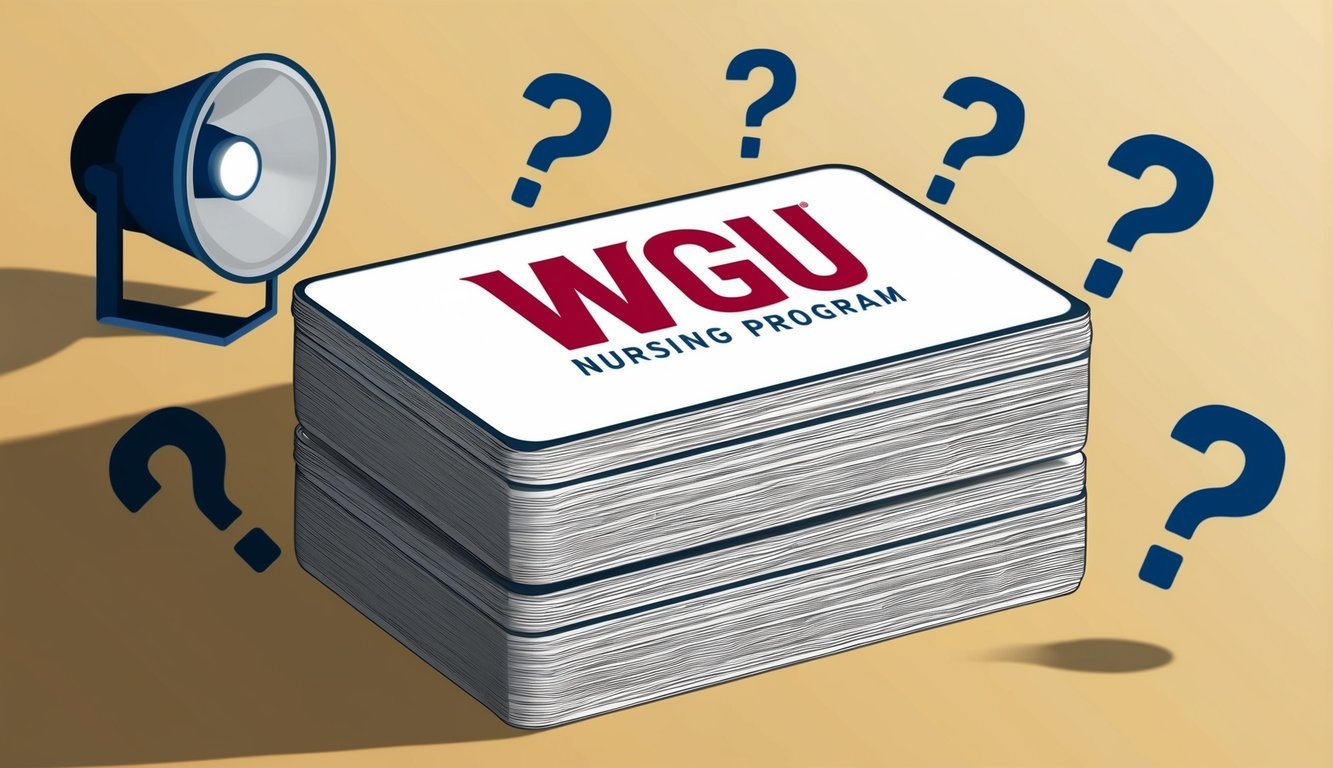The WGU nursing program has gained attention for its unique approach to online education in nursing.
Many students appreciate the flexibility it offers, allowing you to balance work and studies effectively.
With personalized pathways for both registered nurses and those new to the field, WGU aims to meet diverse educational needs.
This program stands out due to its competency-based learning model, which means you can progress at your own pace.
Many are drawn to the ability to earn a Bachelor of Science in Nursing (BSN) in as little as 24 months.
Also, with low tuition costs and various student support resources, WGU looks to make nursing education accessible and manageable.
Exploring firsthand experiences and reviews can help you decide if WGU’s nursing program aligns with your goals.
Grasping the structure, costs, and benefits can guide your decision effectively and position you for success in your nursing career.
Key Takeaways
- The WGU nursing program offers flexibility for working students.
- It utilizes a competency-based approach to learning.
- Tuition costs are relatively low compared to traditional programs.
Overview of WGU Nursing Programs
WGU offers several nursing programs designed to accommodate various career paths and educational needs.
These online programs are flexible and tailored to help you achieve your professional goals while managing other commitments.
Bachelor of Science in Nursing (BSN) Program
The BSN Program at WGU is designed for students who want to start their nursing careers.
This comprehensive curriculum covers essential topics such as nursing theory, patient care, and health assessment.
- Program Length: Typically takes around 2.5 to 3 years to complete.
- Accreditation: The program is accredited by the Commission on Collegiate Nursing Education (CCNE), ensuring high educational standards.
You can study at your own pace, and the program is entirely online, allowing you to balance your studies with work or personal responsibilities.
Engaging with real-world scenarios helps you develop practical skills needed in healthcare settings.
Learn more about the WGU BSN Program.
RN to BSN Pathway
The RN to BSN Pathway is for registered nurses holding an associate degree or diploma in nursing who seek to advance their education.
This program helps you build upon your existing knowledge and skills.
- Program Length: Many students complete this pathway in as little as 6 months.
- Tuition: Costs around $3,998 per six-month term, which is charged per term, making it easier to budget.
This pathway emphasizes leadership, ethics, and advanced clinical practices.
It’s designed to support your growth and prepare you for higher-level nursing roles.
Find more details about the RN to BSN Pathway.
Masters of Science in Nursing (MSN) Tracks
WGU offers several MSN tracks for those looking to specialize further in nursing.
These tracks allow you to focus on areas like leadership or education.
- Program Length: You can complete the MSN in about 2 years, depending on your pace.
- Accreditation: WGU’s MSN programs are also accredited by the CCNE.
The MSN curriculum includes advanced nursing practice, healthcare policy, and research methods.
This program prepares you for roles such as nurse educator or nurse manager, expanding your career opportunities.
Explore the various MSN tracks available at WGU here.
Admission Requirements and Process
Understanding the admission requirements and process for the WGU Nursing Program is crucial.
This includes foundational knowledge, how transfer credits work, and specific application guidelines for different nursing pathways.
Pre-Nursing Foundation
Before applying to the nursing program, ensure you have a strong pre-nursing foundation.
You must complete prerequisite courses, which typically include subjects like biology, chemistry, and anatomy.
A cumulative GPA of at least 2.0 is often required for admission.
WGU emphasizes online learning, so you should be self-motivated and comfortable using technology for your studies.
Consider taking courses at accredited institutions, as this will help in fulfilling the requirements efficiently.
Gathering your transcripts early can expedite the process.
Transfer Credits and Criteria
WGU allows you to transfer credits from previous educational experiences.
If you possess an Associate’s degree or have completed relevant coursework, you may be eligible for credit transfer.
To assess transferability, you will need to provide transcripts and course descriptions.
WGU evaluates these documents to determine equivalency.
Programs like the ADN to BSN can benefit highly from transferred credits, reducing the time to complete the degree.
Make sure to review WGU’s official transfer credit policies to understand how your previous education may apply.
Application Guidelines for RN to BSN and MSN
For Registered Nurses (RNs) looking to advance their education, WGU offers specific application guidelines for the RN to BSN and MSN programs.
You will need to submit an online application, indicating your desired program.
Required documents include your nursing license, transcripts, and proof of clinical experience.
A cumulative GPA of 3.0 or higher is usually expected for these programs.
Keep an eye on deadlines, as admissions are offered throughout the year but may vary by program.
For more detailed information, visit the WGU Admissions page.
Tuition and Fees Analysis

Understanding the costs associated with the WGU Nursing Program is crucial for making an informed decision.
This section covers financial aid options, tuition costs for different programs, and available scholarships.
Financial Aid Options
WGU offers various financial aid options to help students manage their costs.
You can apply for federal student loans, which provide funds for tuition and educational expenses.
To be eligible, complete the FAFSA (Free Application for Federal Student Aid) to determine your aid package.
In addition, you may qualify for grants, which do not require repayment.
WGU also offers payment plans that allow you to spread out your tuition fees over several months.
For more information on financial assistance, you can visit Studentaid.gov.
Tuition Cost per Program
The tuition costs for WGU Nursing Programs are competitive when compared to traditional universities.
The program generally charges a flat rate, allowing you to complete as many courses as you can in a term for a single fee.
For example, the RN to BSN program has a typical cost of around $3,800 for a six-month term.
Tuition may vary based on your specific program; therefore, it’s essential to check the latest rates on WGU’s official site.
This cost-effective structure can lead to more efficient study time and significant savings.
Scholarship Opportunities
WGU also provides various scholarships to help reduce your expenses.
These scholarships can significantly lower your tuition fees.
You can find scholarships specifically for nursing students, which aim to encourage and support those entering this vital field.
Some scholarships are awarded based on academic achievement, while others focus on financial need.
Be sure to check WGU’s scholarship page for current opportunities and eligibility criteria.
Additionally, external organizations and community foundations may offer scholarships you can apply for.
Make it a priority to explore both WGU’s resources and external options to maximize your funding.
Curriculum and Academic Content
The curriculum in the WGU nursing program is structured to provide a well-rounded education.
You will engage in various coursework and gain hands-on experience through clinical assignments.
The program covers essential topics such as nursing leadership, healthcare policy, and patient care.
Nursing Coursework Structure
The nursing coursework at WGU includes foundational subjects like anatomy and physiology, pathology, and physiology.
You will study core nursing concepts through courses that emphasize practical knowledge and critical thinking.
Key Courses Include:
- Nursing Fundamentals
- Clinical Nursing Skills
- Healthcare Policy
- Nursing Leadership
- Nursing Informatics
The curriculum is designed to prepare you for real-world nursing challenges while focusing on necessary skills.
You can expect to learn about nursing theories and their application in different healthcare settings.
Clinical Hours and Assignments
Clinical hours are a critical component of your training.
WGU requires you to complete a certain number of hands-on practice hours in various healthcare environments.
This allows you to apply theoretical learning to real patient care scenarios.
Assignments often include reflections on clinical experiences.
You may also engage in case studies and simulation exercises.
These activities are valuable as they enhance your understanding of patient-centered care and epidemiology.
Specializations in Nursing
WGU offers several specializations that allow you to focus on your interests and career goals.
Whether you are interested in nursing leadership or nursing informatics, you can tailor your learning experience.
Some of the specializations include:
- Nursing Leadership: Focuses on management skills in healthcare settings.
- Nursing Informatics: Combines nursing science with information technology.
- Community Health Nursing: Prepares you to work in diverse community settings.
This flexible curriculum helps you build expertise in your chosen area while ensuring a comprehensive nursing education.
Student Support and Resources

WGU’s nursing program offers solid support through various resources, ensuring you receive guidance and help throughout your education.
From personalized mentorship to connections with industry professionals, these resources are designed to support your academic and career success.
The Role of Course Mentors
At WGU, you are assigned a course mentor who plays a crucial role in your learning journey.
These mentors are experienced professionals in nursing and education.
They help you set goals, stay on track, and navigate the online learning platform.
You can expect regular check-ins to discuss your progress and address any questions.
Having a dedicated mentor means you have someone to turn to for advice on both coursework and career options.
They can provide insights on best practices and help you develop the skills needed in the nursing field.
This personalized support is essential for staying self-motivated in an online setting.
Clinical Coaches and Preceptors
Clinical coaches and preceptors provide hands-on guidance during your clinical practice.
They are experienced nurses who help you apply your theoretical knowledge in real healthcare settings.
Working with a clinical coach allows you to enhance your practical skills and gain confidence in your abilities.
Preceptors often work closely with you during clinical rotations.
They evaluate your performance, offer feedback, and ensure you meet the required competencies.
This dual support system from both clinical coaches and preceptors is vital for your success as you transition from classroom learning to real-world nursing practice.
Alumni Network and Job Placement
WGU has a robust alumni network that can be a significant asset as you pursue your nursing career.
Networking with alumni helps you gain insights into job opportunities and trends in the healthcare industry.
Many alumni are eager to support current students, offering advice and mentorship.
Job placement resources are also available to help you secure a position after graduation.
WGU’s connections with healthcare organizations can lead to job openings that match your skills and interests.
This support is crucial for making a smooth transition into the workforce after completing your degree.
Frequently Asked Questions

When considering the WGU nursing program, you may have specific concerns about admissions, costs, program length, and more.
The following FAQs address common topics to help you get a clearer understanding of the program.
What are the admission requirements for the WGU nursing program?
To enroll in the WGU nursing program, you need to have a high school diploma or equivalent.
Additionally, you must complete certain prerequisite courses.
It’s recommended to check WGU’s official website for the most current admission guidelines and specific course requirements.
How much does the WGU nursing program cost?
The cost of the WGU nursing program can vary based on your course load and length of study.
On average, tuition for the BSN program is around $3,500 per term.
It’s important to verify with WGU for any changes and to explore financial aid options that may be available to you.
What is the NCLEX pass rate for graduates of the WGU nursing program?
WGU boasts a strong track record for its graduates who take the NCLEX exam.
The pass rates are generally competitive when compared to national averages.
For up-to-date statistics, visiting WGU’s official nursing program webpage will provide the most accurate information.
How long does it typically take to complete the WGU prelicensure nursing program?
The time to complete the WGU prelicensure nursing program can vary by student.
Many students finish the program in about two to three years, depending on their pace.
Factors like transfer credits could also affect your timeline.
How are clinical placements managed in WGU’s nursing program?
Clinical placements for WGU nursing students are coordinated to ensure quality practice experiences.
WGU works with local healthcare facilities to arrange your clinical rotations based on your geographic location.
You will receive guidance on these placements from your faculty advisors.
What do graduates say about the credibility and reputation of the WGU nursing degree?
Graduates of the WGU nursing program often report positive experiences regarding the credibility of their degree.
Many find that employers value the education they received.
Checking alumni testimonials and reviews can provide further insights into the program’s reputation.

